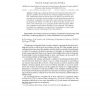Free Online Productivity Tools
i2Speak
i2Symbol
i2OCR
iTex2Img
iWeb2Print
iWeb2Shot
i2Type
iPdf2Split
iPdf2Merge
i2Bopomofo
i2Arabic
i2Style
i2Image
i2PDF
iLatex2Rtf
Sci2ools
GECCO
2003
Springer
2003
Springer
Learning the Ideal Evaluation Function
Abstract. Designing an adequate fitness function requiressubstantial knowledge of a problem and of features that indicate progress towards a solution. Coevolution takes the human out of the loop by dynamically constructing the evaluation function based on interactions between evolving individuals. A question is to what extent such automatic evaluation can be adequate. We define the notion of an ideal evaluation function. It is shown that coevolution can in principle achieve ideal evaluation. Moreover, progress towards ideal evaluation can be measured. This observation leads to an algorithm for coevolution. The algorithm makes stable on several challenging abstract test problems.
Related Content
| Added | 06 Jul 2010 |
| Updated | 06 Jul 2010 |
| Type | Conference |
| Year | 2003 |
| Where | GECCO |
| Authors | Edwin D. de Jong, Jordan B. Pollack |
Comments (0)

